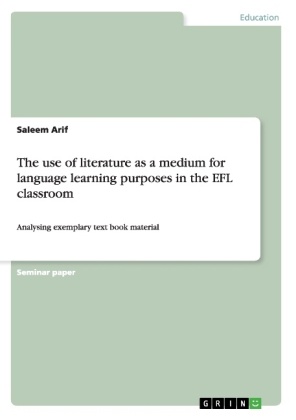Read more
Seminar paper from the year 2015 in the subject Didactics for the subject English - Pedagogy, Literature Studies, grade: 1,0, University of Duisburg-Essen (Department of Anglophone Studies), course: Module F Seminar: Materials, Methods, Media and More: Differentiation in the Language Classroom, language: English, abstract: The development of new digital technologies has changed the use of media for teaching in schools considerably. But despite that, literature has not lost its importance. It is still one of the most important mediums for language learning purposes in the English as a foreign language (EFL) classroom today. Furthermore, literary material is not limited to the classical texts anymore. This becomes obvious when having a look into contemporary teaching English as a foreign language (TEFL) school books, in which a relevant amount of the presented material is based on literary texts not belonging to the canon.The question, however, is how literature is used for language learning purposes and why it is so commonly used in TEFL contexts. Therefore, this paper aims at examining the use of literature for language learning purposes in the EFL classroom on the basis of one specific textbook material that makes use of a literary text. The material is taken from the school book "Pathway. Lese- und Arbeitsbuch Englisch zur Einführung in die gymnasiale Oberstufe", which was published by Schöningh in the year 2014 and is designed for grade 10 at a grammar school (Gymnasium). The literary text itself is an extract from the popular fiction young adult novel "The Namesake" by Jumpa Lahiri and together with the responding tasks and classroom activities it shall serve as the basis for the analysis of how literature or more specifically this chosen material can support the students' language learning effectively.In order to evaluate the material, it is, however, necessary to start with a brief description of current modern principles of foreign language teaching, i.e. the approaches to effective TEFL. Bearing in mind this theoretical context unfolded in chapter 2, section 3 aims to apply this theoretical background in order to evaluate the material in question. Questions that chapter 3 attempts to answer are for instance: What are the aims of TEFL? How is effective language learning perceived? How can the material based on a piece of literature be used in class? Does the material and its recommended classroom activities meet the different aims of TEFL? In what way does the material in combination with the tasks foster effective language learning? The fourth section will contain a critical discussion on the topic. It is supposed to connect the research question, the theoretical context and the analysis.

